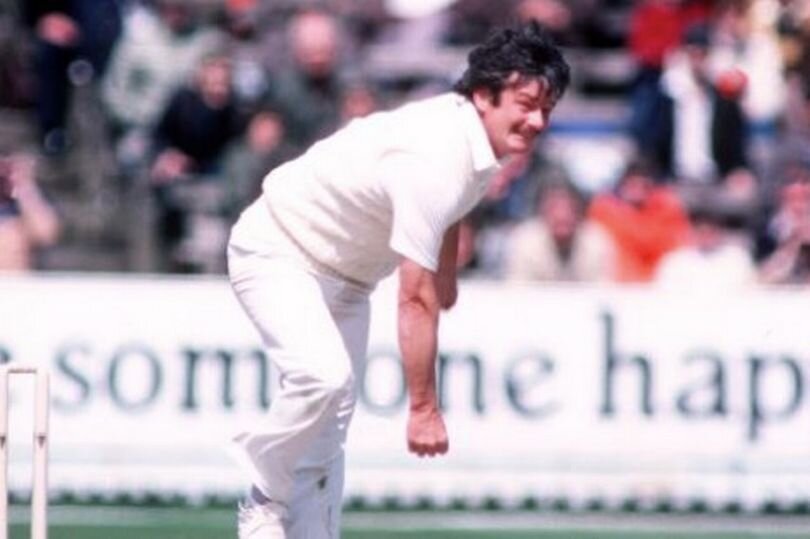by Arunabha Sengupta
Eccentric commentator Alan Gibson had christened him Shoreditch Sparrow, although he did not have any obvious connection with Shoreditch. Robin Jackman had little ability but toiled his way to wickets.
Named in the English squad for the Centenary Test against Australia in August 1980, 35-year-old Robin Jackman had been over the moon. His long-cherished, rosy and increasingly impossible looking dream was ultimately crystallising into reality.But when he reported to the team hotel on the eve of the Test, the receptionist brought him crashing down to earth with the greeting, “Ah, yes, Mr. Jackman. Now you’re only booked for two nights, aren’t you?” The disappointed bowler immediately knew that he had been appointed as a standby.
He did not find a place in the side led by Ian Botham that flew to the West Indies that winter. But, vice-captain Bob Willis not twisted his knee early in the tour. Jackman was called up as replacement.
When suggested that he was in for a roasting from the blades of Clive Lloyd, Viv Richards, Gordon Greenidge and Desmond Haynes, Jackman responded saying, “What the blazes do you know? Nothing, nothing could ever stop me going anywhere or giving up anything for a chance to play for England.”
However, something did
On the eve of the ODI in Berbice, a broadcast from Jamaica alerted the Guyanese Government about Jackman’s ties to South Africa. Rumours flew about during the night. After all, Guyana had been severely anti-apartheid for ages. And when cricket was over for the summer in England, Jackman was used to following the sun down south to Cape Town, where he had a coaching job and turned out in Currie Cup matches. Down the years, he married a South African girl and every English winter was spent in the diamond country.
The local 7 AM radio news had categorically stated that Jackman was not welcome in the country. A potential Basil D’Oliveira situation was on hand
The teams flew to Berbice for the ODI. However, Smith and a large contingent of press men stayed back to pay a visit to the British High Commissioner. Alec Bedser, chairman of the England selection committee, was asked live on British television about Gleneagles Agreement. He had responded, “Well, I dunno, all I know is there’s a nice golf course there.” Few knew how to interpret this with regard to the Jackman case. Neither did Phillip Mallet, the High Commissioner, have any idea what the Guyanese Government would decide.
Jackman was not playing in the ODI and the West Indies won by six wickets. The teams returned to the hotel, with the medium pacer wondering what was in store for him.
Soon, a man in a stiff uniform arrived at the hotel, asking, “Which is Mr Jackson’s room?” The notice he served to the Surrey bowler read:
“REVOCATION OF PERMIT
Under
Section 21 (4B) of Immigration Act
(Cap: 14.02)
Take Notice that on the direction of the President the permit granted to you on the 23rdFeb 1981 to enter and remain in Guyana for a period of two weeks is hereby revoked with immediate effect.
(Signed) J. Thorne, Deputy Supt, Immigration”
The Georgetown Test was called off. Strangely, a heated argument that followed among the journalists accompanying the team regarding whether Wisden should label the Test as ‘abandoned’ or ‘cancelled’. However, there was a more than serious shadow of doubt about the rest of the tour as well.
Thankfully, the Barbadian Government did not follow the same policy and allowed cricket to be played. Jackman at long last donned the English sweater. He bowled well to take four for 68 against Barbados and made his international debut in the third Test at Bridgetown.
England were trounced by a huge margin of 298 runs with Viv Richards scoring a majestic 182 in the second innings. But, Jackman managed to impress with figures of 3 for 65 and 2 for 76.
The West Indians did have a bit of a problem facing his bowling, but none of them had any objection to playing against him.
Robin Jackman - he was a very, very good swing bowler, with 1402 first-class wickets at 22.80, mainly for Surrey. But he is remembered more for this incident.
And he became a popular commentator.
The last time I saw him he was in his early 60s, smoking like a chimney in between commentary stints.
Given the number of death-sticks he smoked as I watched, it is quite a miracle he made it to be 75.
Rest in peace, Shoreditch Sparrow.

